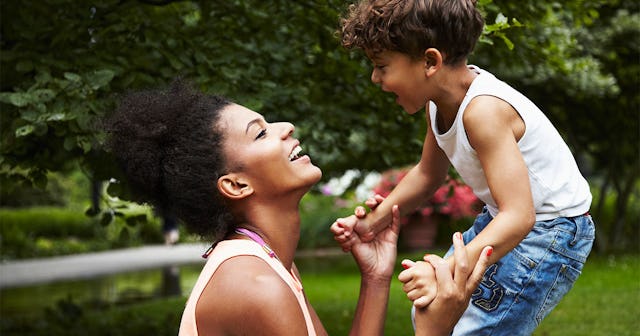4 Things I Had To Give Up To Become A Better Parent

1. I Gave Up Trying To Make ‘Mom Friends’
“Have you made any new ‘mom friends’ yet?” — a question I was frequently asked during the first year of my son’s life.
I’d heard you could make “lifelong friends” from the local mothers’ groups, but they didn’t really work for me.
What I saw was a gang of anxious, insecure new parents all trying to find their groove with their own baby while comparing themselves to each other.
So, I passed on the mothers’ group invites.
My alternative? Trying to “pick up” new mum friends in the playground — which was way out of my comfort zone as an introvert.
So, I took the pressure off making friends and instead…
I focused on building a relationship with my baby.
I spent a time alone getting to know him — going for walks, playing, feeding, etc. — where I could be fully present, and building attachment.
I was still keen to learn from other parents and connect, but at a “safe” distance, away from judgement and without the pressure of playdates.
I searched for information and online groups that spoke to the way I wanted to parent, and in doing so, I was able to lean into topics and parenting discussions that resonated with me.
I became a more confident parent as a result.
Making new mum friends became easy and natural from there.
2. I Gave Up Schedules And Deadlines
Oliver Rossi/Getty
From the minute our children are born, we are presented with a set of documented milestones — growth charts, milk schedules, sleep patterns, etc.
At first, this seemed to satisfy my need to be organized, but any plans and timelines went out the window early on.
My baby refused to follow schedules, and I began to see how these society-driven expectations were (mostly) not realistic.
So instead, I chose to parent to the rhythm of my child’s unique development.
This helped me create my own parenting picture — one that doesn’t adhere to a conventional timeline.
For me, it looks like:
- continuing to breastfeed (3 years and counting)
- not rushing him to “independently” sleep
- potty training when he was physiologically and emotionally ready (instead of when was convenient)
- prioritizing my child’s needs over my social calendar
It means I’m an unconventional parent (which comes with its own social challenges), but I’m a happier parent nonetheless.
3. I Gave Up Worrying About Screen Time
I was one of those people who said, “When I become a parent, I won’t let my child watch TV.”
Oh, how naive.
I did my best to delay screens, but as my son became more active, my capacity to care for him and maintain my mental and physical wellbeing without screens wore thin.
He started watching TV just before his second birthday, and so came an extra dose of parental guilt about whether it was the right thing to do.
Most parents are aware that significant screen time can have damaging effects on a child’s development. But, when you’re the primary carer to an adventurous little boy, have no family support and need to take a shower, you’re left with few options.
So, one day I gave up worrying about it and looked objectively at how I could use screens as a parenting tool.
Firstly, I got clear on why I wanted to use screens:
To provide “safe” entertainment that didn’t require my input, when all manual games, toys and independent play had been exhausted.
I then created some unwritten family rules for screen use like:
- only viewing screens at home (a flexible rule), which means preferably TV and not smaller devices such as phones and iPads
- a maximum of 1 hour a day (another flexible rule)
- age-appropriate shows only
- co-watching when possible (which means watching the program with him as a way of co-playing)
- engaging in a manual activity or game afterwards with him, so it’s easier for him to shift back to play and reconnect (we seem to avoid tantrums this way).
With all this, the guilt dispersed.
I gave up the idea of being a “screen-free parent” and instead became a “screen-lite parent” — which has made me a more relaxed and guilt-free parent overall.
4. I Gave Up How I Was Parented
Tang Ming Tung/Getty
We‘re not given a guidebook when we become parents — we inherit the parenting style we experienced.
Our guidebook is our own childhood, but that doesn’t mean we have to follow it.
As a child of the ’80s, I was to be “seen and not heard,” and “good” behavior was required.
It feels easier to follow this “old-school” approach — especially as an authoritarian style of parenting is still mainstream today.
But I felt a strong urge to take a different path.
Being a “gentle parent” has required a lot of conscious effort.
As someone who likes to be in control, learning how to respect my son’s age-appropriate behavior (no matter how crazy!) and focus on how I respond to him instead did not come naturally at first.
And it’s been heavy sometimes too, particularly when confronted with behavior and emotions I wasn’t allowed to express as a child.
Yet, being mindful about how I parent has required a great deal of self-awareness and allowed me to grow stronger overall.
My parents did the best they could, given their knowledge and circumstances. Taking a different path to them is not critical of how I was raised, but instead, an empowering way to become my true self and take ownership of motherhood.
Letting go of these four things has made me a better parent — one who is more present, confident and unapologetic about my choices.